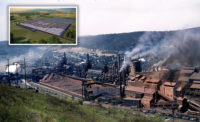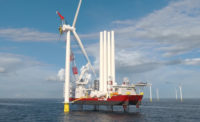Santa Clara, Calif-based sodium-ion battery maker Natron Energy Inc. is preparing to build a $1.4-billion plant in North Carolina that would be the first U.S. "gigafactory" for the technology, company and state officials announced Aug. 15.
The 1.2-million-sq-ft plant would be built on a 437-acre site in Edgecombe County that had been set for a now-cancelled Chinese manufacturer's tire factory. The North Carolina factory would have a 24-GW capacity that the company says would increase its production capacity by 40 times.
The company opened its first commercial-scale plant earlier this year in Holland, Mich. That plant has a 600-MW capacity, which Natron said would serve as a “blueprint” for its larger future facilities.
Natron expects to supply batteries from the plant for data centers, microgrids, electric vehicle charging systems and other uses. Its batteries do not require the same expensive minerals such as lithium, copper, nickel and cobalt as do lithium-ion batteries, with the firm claiming that its product outperforms others in power density and recharging speed. Natron also said its batteries, which use aluminum, iron, manganese and sodium electrolyte, are non-flammable and offer an environmental alternative to lead-acid and lithium-ion batteries.
“This flagship manufacturing facility will dramatically accelerate our efforts to deliver sodium-ion batteries to customers who are hungry for safe, reliable, and environmentally responsible energy storage solutions,” said Colin Wessells, co-CEO of Natron, in a statement.
"This is important when we think about supply chains and geopolitics [because] anywhere on earth where you can make stainless steel, you can make a Natron battery," he told S&P Global earlier this year.
The firm said its products "are based on a unique and patented Prussian blue electrode chemistry ... that stores and transfers sodium-ions faster, and with lower internal resistance than any other commercial battery on the market today." Wessells said other sodium-ion products coming to market "generally use either carbon-based or ceramic-based terminals in the battery as opposed to Prussian blue for ... highest energy densities—which makes them more attractive for certain segments of the electric vehicle market." But "we've made a trade-off," he told S&P Global.
Wessells stressed that "in return," Natron delivers higher power capability, service life and safety, which are "important for a lot of our customers. There's less total energy inside this battery, so you can't provide that power for very long, but the maximum power you can deliver [at once] is much higher." He said that potential is "very attractive in industrial applications where you're trying to manage the power in a business environment. It's not really an issue of how much energy is in the box, it's about how fast can we pull it all out."
A Natron representative said the firm could not yet comment on contractor selection for the new plant.
Natron is set to receive a Job Development Investment program grant from the state worth up to $21.7 million over 12 years. Officials also plan for the county to receive a $30-million megasite readiness program grant from the state to help prepare it.
It has raised around $300 million from investors, according to PitchBook.






